How Does a Compressor Work? (Types & Advantages)
-
Codee Chessher
- Last updated:
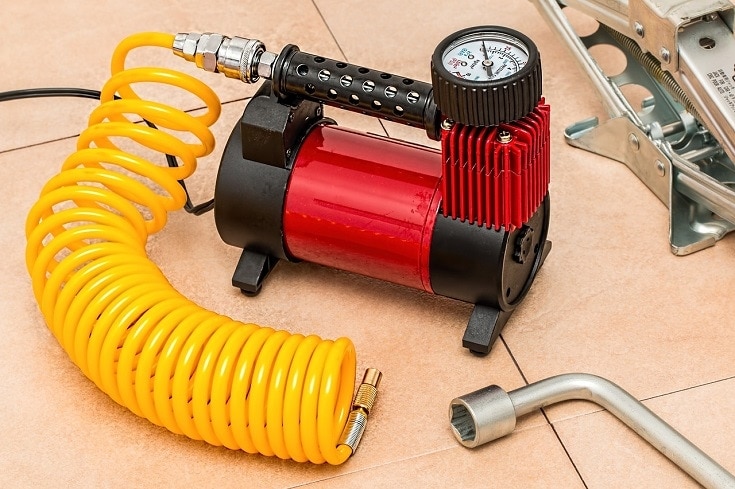
Most people probably know what an ordinary air compressor looks like but may not know everything it can do. Depending on the size, shape, and intended effect, a compressor can help us tackle many heavy-duty jobs and everyday tasks alike.
In this article, we’ll cover exactly what a compressor is, some uses for them, types of compressors, and more. Let’s dive in with the details below.
What Is a Compressor and How Does It Work?
Compressors are machines that compress the volume of a gas to drastically increase its pressure. Most compressors have controls like air filters, pressure gauges, and different types of nozzles for varying applications. The compressor may have different types of attachments depending on whether it was designed for storing gasses, inflating tires, or as power sources for pneumatic tools.
At its core, a compressor uses a pump, crankshaft, and crankshaft to pressurize gas into a suitable storage container. Compressors are most prized for their ability to take diffuse gas and put it into easily transported containers, but that’s not all.
Pressurizing gas this way creates potential energy within the storage container, and releasing that gas can be exploited in many ways. Sometimes, as with natural gas, it’s more for storage, but with air compressors, you can use the pressurized air in numerous ways.
There are many uses for a compressor, both at home and in petroleum refinery facilities. So many that it’s much more economical to display them in a handy-dandy bulleted list. Let’s check those uses out below.
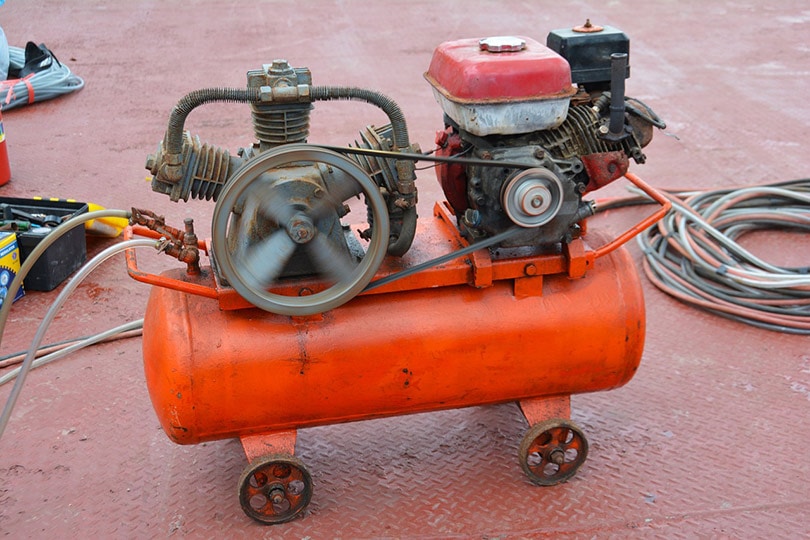
Uses for a Compressor:
- Sanding or painting
- Inflating tires, balloons, and other inflatable items
- Pressurizing aircraft cabins
- Pressurizing natural gas or chemical products in refineries
- Powering pneumatic tools like drills, ratchets, impact wrenches, etc.
- Nail guns for carpentry
- Storing air for underwater exploration & recreation
- Storing gasses for dentistry & other medical fields
Compressors are an essential tool for modern industry, where they provide more heavy-duty power and control for assembly than ever before. Folks at home can use them to power sanders, air drills, nail guns, and many other useful DIY tools. Most people already know they’re useful for inflating tires, too. All in all, compressors are a very useful item in everyday life and a necessity for many industries out there.
Next, we’ll get into the types of compressors and how they each work.
What Are the Different Types of Compressors?
There are two main types of compressors, with all of the main compressors falling into either category. These are positive displacement compressors that take a fixed amount of gas and pressurize it, and dynamic or dynamic compressors that continuously trap gas with an impeller fan and increase its volume through a diffuser. Let’s take a brief look at some of these and what they’re used for.
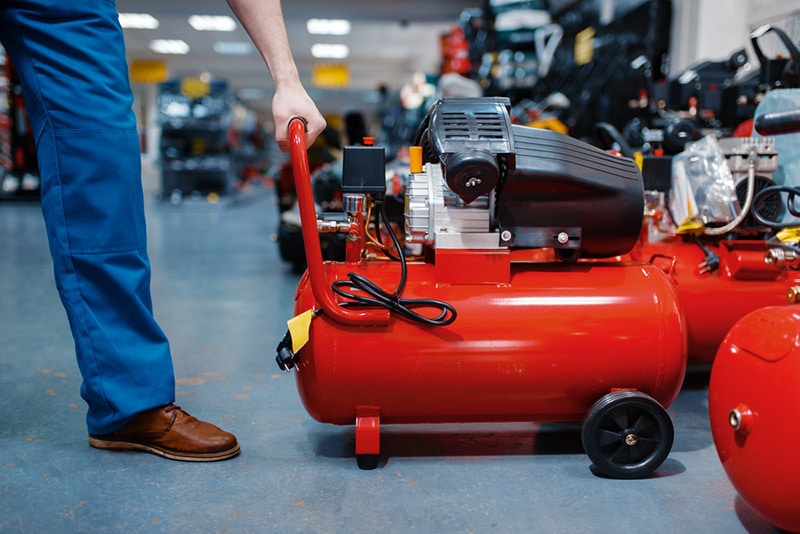
Types of Compressors:
- Rotary compressor: uses two opposite-facing screws to generate heat and contain air in a pressurized chamber, mostly used in industrial applications
- Reciprocating compressor: uses a piston to displace and pressurize a fixed amount of air, useful for medical gasses, oil refining, automotive repair, and air conditioners
- Axial compressor: heavy-duty and expensive compressors that move an immense amount of air, largely used in aeronautical fields
- Centrifugal compressor: the definitive dynamic compressor, these are quieter and smoother than other compressors because they continuously trap gas with an impeller fan
Where Are Compressors Used?
Compressors are used in many jobs around the world, but we’ve narrowed down a list of some places you’ll find them used. Check them out here:
- Oil refineries
- Power plants
- Chemical plants
- Aircraft hangars
- Auto mechanic shops
- Garages & workshops
- Construction sites
- Factories
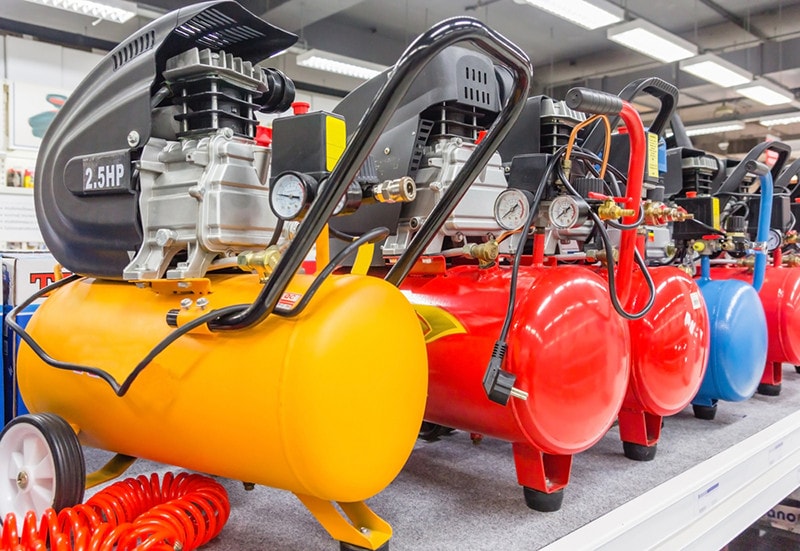
Advantages of Compressors
Compressors, specifically air compressors, are invaluable tools for many different tasks and have some unique characteristics to back them up. Let’s cover some of the greatest benefits they provide.
Pros of Compressors:
- Safer than other power sources because there’s no heat or electricity involved
- Compressor-powered tools often boast more power than their electric counterparts
- Many types of applications across a scattering of industries
- Air-powered applications are often more energy-efficient than electric alternatives
- Can help bolster productivity
Disadvantages of Compressors
Despite their impressive advantages, compressors have some notable drawbacks that you should learn about. It’s stuff you’ll either have to live with or stuff you can mitigate in some way, so let’s wade in.
Disadvantages of Compressors:
- Heavy-duty models can be extremely heavy
- Higher-end models are expensive
- Some models can be difficult to store because of an irregular shape or large size
- Most compressors are very loud, with dynamic models as an exception
- Require maintenance to keep operating at a high level
 Frequently Asked Questions (FAQs)
Frequently Asked Questions (FAQs)
How Do I Select the Right Compressor for My Needs?
For most people at home and light construction use, a midrange compressor will serve your needs well. However, you have to look at the flow rate, PSI, the type of gas, and if portability is a factor. The compressors in air conditioners, for instance, wouldn’t have enough pressure to be suitable for pressure washing houses. Higher horsepower means higher PSI applications, so check the requirements for the tool or job you’re doing first and go from there.
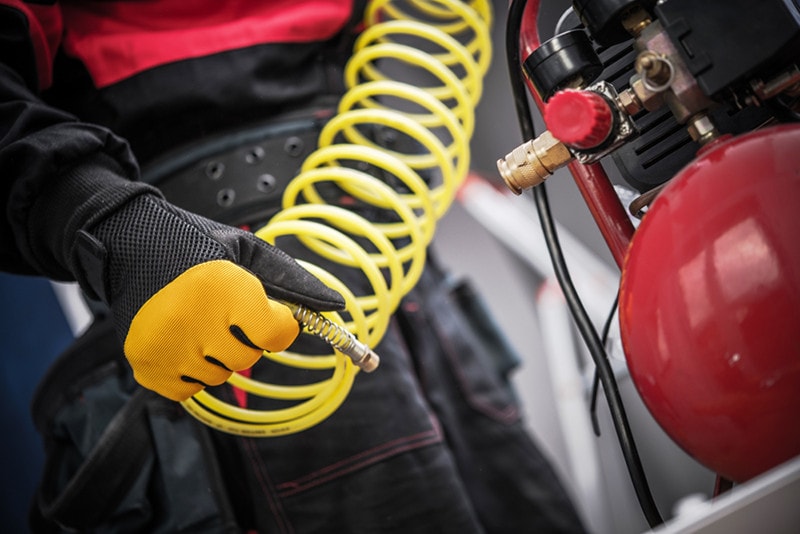
Do I Need to Take Safety Precautions When Using a Compressor?
Yes, there are some vital safety tips you should learn about using a compressor. These tips will help keep you safe when using a compressor, so make sure you memorize them!
Compressor Safety Tips:
- Only use gas-powered compressors outdoors unless there’s ample space and air circulation.
- Always use safety goggles or glasses when using air-powered tools
- Don’t overload the compressor by trying to use it for something it’s not designed for
- Stay vigilant for signs of leaks, especially with flammable gasses like propane or natural gas
- Read the documentation for your tool and make sure the PSI and other parameters match up with the compressor
- Perform maintenance on your compressor as recommended by the manufacturer’s instructions or packaging
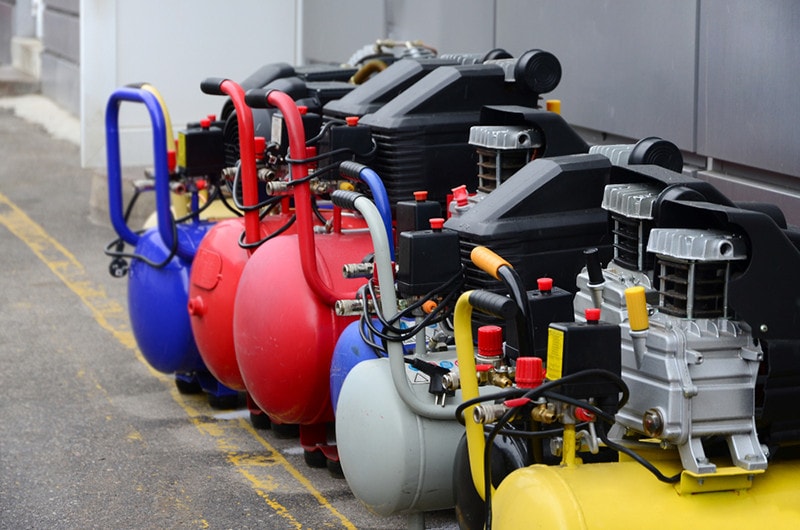
How Do I Tell if My Compressor Is Going Bad?
There are several ways you can identify a compressor with a problem or on its way out. Sometimes these issues are fixable, while other times they’re a critical failure in the machine. Check some of these common signs below so you can spot them yourself—you may have the chance to save the compressor in some cases!
Common Compressor Problems and Their Root Causes:
- Low pressure is caused by motor failure, power source problems, clogged filters, leaks, or damaged valves.
- Excessive noise is typically because of worn, damaged, loose, or outright broken components within the compressor system or perhaps the tool’s air hose.
- Oil leaks are usually caused by loose, worn, or broken seals or fittings in the compressor, and can cause dangerously low oil levels.
- Short circuits happen when an electrical component is broken in the compressor or power outlet, such as a blown fuse or faulty wire.
Conclusion
Compressors are an integral part of life, from heavyweight industrial applications in oil refineries and chemical plants to painting cars and inflating them. As long as you’re careful to adhere to safety precautions like wearing goggles and not using gas compressors indoors, you’ll be fine.
Featured Image Credit: stevepb, Pixabay
Contents
